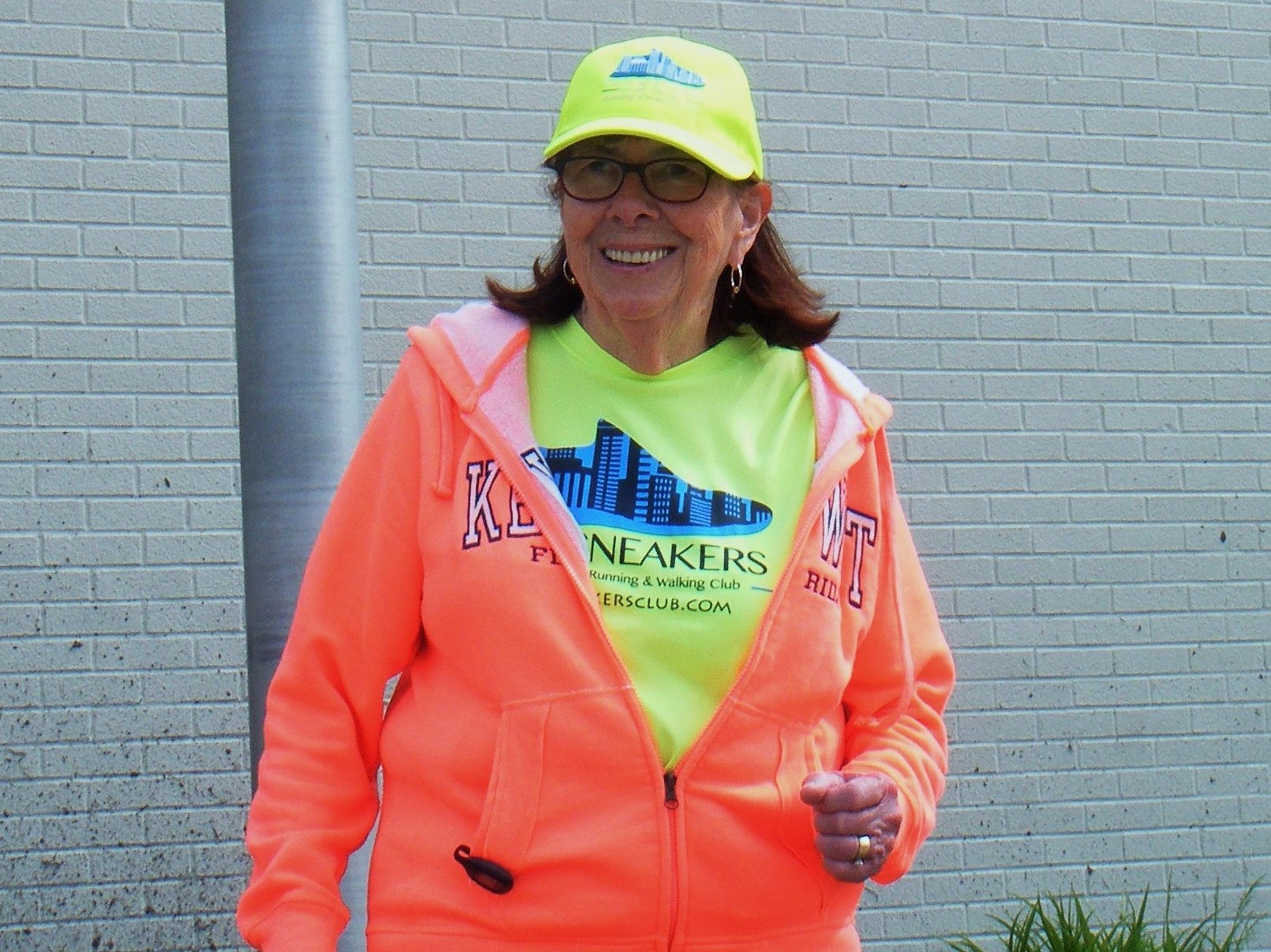When in Doubt, Go for a Walk: Why Steps are So Good for Your Whole Health
Amy Barczy
| 5 min read
Amy Barczy is a former brand journalist who authored content at Blue Cross Blue Shield of Michigan. Prior to her time at Blue Cross from 2019-2024, she was a statewide news reporter for MLive.com. She has a decade of storytelling experience in local news media markets including Lansing, Grand Rapids, Holland, Ann Arbor and Port Huron.

When in doubt, go for a walk.
Why does walking seem to fix everything? From mental health to physical health, stepping outside your door to take a walk brings countless benefits.
Blue Cross Blue Shield of Michigan member Gail Starzynski of Eastpointe credits walking with helping keep her young, managing her blood pressure and waking up in the morning pain-free. At age 75, Starzynski logs two miles a day or more – in addition to running, tap dancing and teaching Zumba Gold.

“I keep moving because I can, and I can because I keep moving,” Starzynski said. “Walking doesn’t require any skills except a good pair of shoes and a positive attitude. That’s one of the beauties of it. You don’t have to be with anyone else – although it is fun. And I enjoy nature.”
Walking – whether it’s on the treadmill, inside at a mall, around the block or on a trail – is a great step to support your whole health.
Physical health benefits of walking
When Starzynski retired from a desk job she had high blood pressure. Although she still takes her blood pressure medication, she has since lowered her blood pressure and lost 20 pounds – health improvements she credits to how much more she was able to move post-retirement.
Walking is an easy form of physical activity that helps improve the function of the body’s circulatory system, which helps reduce the risk of many chronic conditions.
“Walking a little over 20 minutes each day can cut your risk of heart disease by 30%,” said Dr. Angela Seabright, D.O., a care management physician at Blue Cross Blue Shield of Michigan. “It’s also linked to reduced risks for type 2 diabetes, stroke, high blood pressure, several types of cancer – and can help keep your mind sharp.”
Experts estimate that physical activity like regular walking could save Americans more than $100 billion a year in health care costs. Yet many people are inactive: more than half of all adults in the U.S. do not meet the guidelines for aerobic activity – and about 75% of adults don’t meet guidelines for aerobic and muscle-strengthening activities.
The U.S. Centers for Disease Control and Prevention recommends that each week, adults need 150 minutes of moderate-intensity physical activity, and two muscle-strengthening activities. This could look like:
- Walking 30 minutes a day, 5 days a week; and two days with muscle-strengthening activities like lifting weights, using resistance bands, body weight exercises, heavy gardening or some forms of yoga.
- Jogging or running for a total of 1 hour and 15 minutes each week; and two days with muscle-strengthening activities.
“Walking doesn’t have to occur in one continuous 30-minute session: small moments of movement throughout the day can add up to your total goal,” Seabright said.
Mental health benefits of walking
Walking has been linked to a host of mental health benefits, including:
- Stress reduction
- Improved concentration
- Higher productivity
- Reduced depression risk
- Improved IQ
- Better sleep
- Improved creativity
- Improved mood
- Confidence booster
- Better memory
“Physical activity like walking is a great addition to your daily routine to help manage your stress – which can go a long way to improving your quality of sleep,” Dr. William Beecroft, medical director of behavioral health at Blue Cross Blue Shield of Michigan. “Getting good sleep every night is an important part of improving your mental health – as well as physical health factors like lowering your risk of cardiovascular disease and stroke.”
Studies have shown adults who got the recommended amount of physical activity each week – about 2.5 hours of brisk walking; or 21 minutes a day – have a 25% lower risk of depression, according to the American Psychological Association. Even in adults that achieved half of that recommendation – a total of 75 minutes of brisk walking each week – had an 18% lower risk of depression.
The 10,000-step misnomer
The goal of hitting 10,000 steps a day has become a popular trend – yet this goal may not be attainable. Research indicates walks do not have to be long or extensive; a recent study found just 11 minutes of walking a day makes an impact.
Walks just need to be consistent and regular: a study found individuals who used walking as their primary form of exercise showed the number of times they walked per week was directly linked to positive impacts on their emotional health. However, how long their walks were had no significant impact.
Starzynski said she used to track her steps to hit a certain goal – but that started to take the fun out of the activity and movement.
“I used to, but it became an obsession. I know my paths now. I don’t really clock it anymore,” Starzynski said. “It’s more fun without trying to set a goal and being conscious. This time of year, the nature is so beautiful – you’re not checking your wrist all the time.”
Growing connections to stay active
Five years ago, Starzynski joined a local group – City Sneakers Walking and Running Club in Mount Clemens – to help keep her accountable and continue making new strides.
“I needed to find a group of people with similar interests,” Starzynski said. “Some of my friends are gone and some have health or mobility issues. City Sneakers provided me with new friends I could engage with.”

City Sneakers meets every Tuesday night for a walk or run around Mount Clemens for two, four or six-mile routes. Afterwards, the group gathers to socialize at a local restaurant.
“Walking is very enjoyable with that group,” Starzynski said. “In the summer there can be 50 people. They are great people: runners and walkers are very non-judgmental and supportive.”
The friendships that grow in the walking group have helped Starzynski stay mentally and socially strong as well.
“You’re building a bigger network – it’s helping not only with moving, but it’s keeping your mind active,” Starzynski said.
Talk to your doctor about whether walking is a good exercise to incorporate into your daily routine. People with chronic conditions like heart problems, arthritis, diabetes or high blood pressure may especially want to talk to their doctor about the right types and amounts of physical activity for them.
Photo credit: Courtesy of City Sneakers Walking and Running Club and Gail Starzynski.





